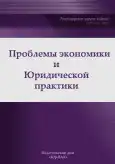Potential of Machine Learning for Development of the Venture Capital Investments in Russia
- Authors: Kazakova E.D.1
-
Affiliations:
- Financial University under the Government of the Russian Federation
- Issue: Vol 19, No 2 (2023)
- Pages: 209-215
- Section: Mathematical, Statistical and Instrumental Methods in Economics
- URL: https://journals.eco-vector.com/2541-8025/article/view/568528
- ID: 568528
Cite item
Abstract
Currently, the Russian economy is facing unprecedented sanctions pressure from Western countries. In addition to import substitution and digitalization, one of the most important directions of government policy is the simplification and stimulation of new technological solutions (startup projects). The aim of the research is to study the potential of using artificial intelligence and machine learning in pre-investment analysis of the startup projects' potential profitability at early stages of development for subsequent venture investment. As a result, a number of recommendations have been proposed for the development of venture investment in Russian startup projects. Furthermore, the technological and information foundation has been described in accordance with the directions of the application of artificial intelligence and machine learning. The approaches to formalizing the parameters of the future venture investment recommendation system have been explored for subsequent practical application: identifying promising startup projects, calculating risks and potential profits.
Full Text
About the authors
Ekaterina D. Kazakova
Financial University under the Government of the Russian Federation
Author for correspondence.
Email: 191841@edu.fa.ru
ORCID iD: 0009-0008-8081-1722
SPIN-code: 6714-5454
Russian Federation, Moscow
References
- Amram, M., & Kulatilaka, N. (1999). Real Options: Managing Strategic Investment in an Uncertain World. Harvard Business School Press. https://books.google.fr/books?id=dM16QgAACAAJ.
- Business Evaluation: Textbook / Edited by A.G. Gryaznova, M.A. Fedotova. —Moscow: Finance and Statistics (in Russia), 2009. —Chapter 7.
- Dittmann I., Maug E., Kemper J. How fundamental are fundamental values? Valuation methods and their impact on the performance of German venture capitalists //European Financial Management. —2004. —V. 10. —№. 4. —P. 609–638. https://www.researchgate.net/publication/227361733_How_Fundamental_are_Fundamental_Values_Valuation_Methods_and_their_Impact_on_the_Performance_of_German_Venture_Capitalists.
- Fisher I. The theory of interest //New York. —1930. —V. 43. —P. 1–19.
- Gartner, Press Release STAMFORD, Conn. March 10, 2021 Gartner Says Tech Investors Will Prioritize Data Science and Artificial Intelligence Above «Gut Feel» for Investment Decisions By 2025 https://www.gartner.com/en/newsroom/press-releases/2021-03-10-gartner-says-tech-investors-will-prioritize-data-science-and-artificial-intelligence-above-gut-feel-for-investment-decisions-by-20250.
- Retterath,Andre. 2020. The Future of VC: Augmenting Humans with AI. https://mediatum.ub.tum.de/doc/1574989/1574989.pdf.
- Arroyo, J., Corea, F., Jiménez-Díaz, G., & Recio-García, J.A. (2019). Assessment of Machine Learning Performance for Decision Support in Venture Capital Investments. IEEE Access, 7, 124233-124243. https://www.semanticscholar.org/paper/Assessment-of-Machine-Learning-Performance-for-in-Arroyo-Corea/a076d1e0f713a14fed555ee4493c2196227b9a0f.
- Ross, Greg and Das, Sanjiv Ranjan and Sciro, Daniel and Raza, Hussain, Capital VX: A Machine Learning Model for Startup Selection and Exit Prediction (September 1, 2020). Available at SSRN: https://ssrn.com/abstract=3684185.
- Antretter, Torben & Blohm, Ivo & Sirén, Charlotta & Grichnik, Dietmar & Malmstrom, Malin & Wincent, Joakim. (2020). Do Algorithms Make Better—and Fairer—Investments Than Angel Investors? Harvard business review. https://hbr.org/2020/11/do-algorithms.
- Paul Gompers & Josh Lerner, 2006. «The Venture Capital Cycle, 2nd Edition», MIT Press Books, The MIT Press, edition 1, volume 1, number 0262572389, December. https://ideas.repec.org/b/mtp/titles/0262572389.html.
- Sahlman, William A., and Daniel R Scherlis. A Method for Valuing High-Risk, Long-Term Investments: The «Venture Capital Method». Harvard Business School Background Note 288-006, July 1987. (Revised October 2009.) https://www.hbs.edu/faculty/Pages/item.aspx?num=6515.
Supplementary files














